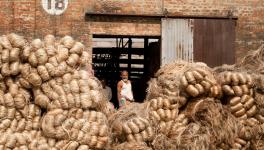COVID-19: Jute Growers Make a Tidy Sum While Mill Workers Suffer in Bengal
Kolkata: Even if smiles elude West Bengal’s jute mill workers and the 21 trade unions representing their interests this year, lakhs of jute growers have reason to cheer. For, different factors impacted the production of this natural fibre resulting in raw jute prices selling significantly above the minimum support price (MSP).
This price spurt in raw jute has occurred under somewhat fortuitous circumstances, after three consecutive difficult seasons for growers. Notably, COVID-19 did not in any way tell upon the schedule for sowing, nurturing and harvesting – all generally handled by growers and their family members.
However, for mill workers, which include a large number of migrant labourers, life has been tough as they faced loss of wages for the lockdown period that took effect on March 24 and lasted till May 31. This was despite a clear advisory from competent authorities that wages must be paid without any reduction during the lockdown.
The situation was tougher for migrant workers, as due to sentimental reasons they wanted to be with their near and dear ones in their native places, but going back home led to more miseries.
In this backdrop, the 21 trade unions in the sector have stepped in. In their representation to the mill management, the unions have demanded payment of full wages for the lockdown period; compensation for any loss of life due to COVID-19; addition of working days during the lockdown for purposes of leave with wages.
Their demands also include that there should be no change in work patterns or workload on the plea of “rationalisation”, no recourse to outsourcing of workers, payment of gratuity and other statutory dues and the repair or reconstruction of workers’ quarters, common toilets, drainage systems badly damaged under the impact of super cyclone Amphan.
While the mill workers keep their fingers crossed and trade unions wait for a positive response by mill managements and an effective intervention by the state’s labour department, the mill owners are doing well. The B Twill jute-bag supply scenario under the government account for procurement in the current kharif marketing season and the next rabi marketing season (RMS) “finds the mills operating in virtually a sellers’ market”.
Notably, the Centre and state governments now have a clear picture about the availability of B Twill bags for grain packaging. This is despite the persisting differences in the estimate of the final raw jute crop size. The Jute Commissioner (JC) has virtually nipped in the bud the mills’ suggestion to be allowed to import raw jute to augment supplies and subdue prices.
Taking note of the mills’ supply commitment, the Department of Food and Public Distribution (DFPD) of the Ministry of Consumer Affairs at the Centre, vide its letter on September 22, informed the JC’s office that the proportional allocation of new jute bags for KMS 2020-21 had been worked out at 13.8 lakh bales against the states’ indent for 23.87 lakh bales.
The 16 indenting states and agencies are: Andhra Pradesh, Bihar, Chhattisgarh, Food Corporation of India, Gujarat, Haryana, Jharkhand, Madhya Pradesh, Maharashtra, Odisha, Punjab, Tamil Nadu, Telangana, Uttar Pradesh, Uttarakhand and West Bengal.
The DFPD has told the JC’s office to “allocate the supply of new jute bags proportionately according to states’ net demand for KMS 2020-21... subject to placement of indent with funds by SPAs” (state procurement agencies).
Asked about the supply commitment falling short of the assessed requirement, the ex-chairman of the Indian Jute Mills Association, Sanjay Kajaria, told NewsClick that although operations of mills had largely stabilised, yet they would have to stretch to meet a maximum of 60% of the demand for B Twill bags. The deficit would be made good by states by procuring second-hand jute bags, which are available. Synthetic bags do not suit their needs and, therefore, the option is to arrange second-hand jute bags. The highly satisfactory kharif output is necessitating a larger requirement of jute bags this time round, Kajaria said.
With a view to ensuring a balance in supply, jute mills have been asked by the JC’s office to plan before offering goods for inspection. They have been asked to do it keeping in mind that the total inspected quantity in October covers at least 60% of the backlog in relation to orders issued between June and September, and the remaining percentage quantity from orders issued in October. “The position will be reviewed after October and any failure in maintaining the ratio will be dealt with strictly as per procedure,” the JC’s order noted.
For now, the JC has ruled out import of raw jute from Bangladesh to augment domestic availability . However, the JC has offered to review its decision in January or February next year. In support of its stand, it furnished its own assessment of the fibre availability for the ongoing jute year to IJMA.
The mill consumption has been assumed at 5.5 lbs per month and estimates do not indicate any urgency for import.
The JC has further argued that with the extremely conservative production of 55 lbs by the Jute Balers Association (JBA), the availability (taking into account carry-over of 18 lbs) will work out 73 lbs for 2020-21. If 20% jute of higher grade is set aside for manufacturing hessian and diversified products (for use other than in making B Twill), the availability of the domestic fibre for B Twill under The Jute Packaging Materials (Compulsory Use In Packing Commodities) Rules, 1987 (JPM Act) will work out to 58.4 lb. (73 lbs minus 14.6 lbs).
The IJMA has already committed 13.8 lbs of B Twill for KMS. For RMS, a production level of 16 lbs of B Twill for supply under the JPM Act may be realistically assumed. Thus, for a total B Twill supply of 30 lb, the raw jute requirement will be about 48 lb. This would be more than what should be available. There is, therefore, no reason to panic on this count.
According to JBA secretary Abhijit Kumar Palit, raw jute prices in the Kolkata market for the representative TD 5 (tossa desi) grade were Rs 5,675 per quintal between October 18 and October 20. Compared with Rs 5,500 on September 4 and Rs 5,350 on August 26, the MSP for the current season is Rs 4,225. Keeping in mind the expenditure of between Rs 600 and Rs 700 per quintal involved a host of post-harvest to pre-marketing activity, it is safe to suggest that growers are getting a tidy sum above the MSP and that should sustain their interest in raw jute growing, Palit contended.
How is the situation viewed by trade union leaders? When asked how mills were pleading their inability to supply B Twill beyond 13.8 lbs, general secretary of Federal Chatkal Mazdoor Union, affiliated to All-India Trade Union Congress, Debasish Dutta told NewsClick: “I think mills are trying to build up a case for a subsidised funding scheme for upgradation of facilities. At the moment, there is none. Payment under the previous scheme was withheld for various reasons”, Dutta added.
Asked whether there has been a 100% reverse migration, general secretary of Bengal Provincial Chatkal Majdoor Union, Dipak Saha, told NewsClick, “I think 15% to 20% are yet to return; transport services are still far from normal. But we are hopeful they will come back.” Asked whether they will be offered jobs by mills after their return, he said: “Are all those who have since returned being regularly given jobs, please find out.”
Get the latest reports & analysis with people's perspective on Protests, movements & deep analytical videos, discussions of the current affairs in your Telegram app. Subscribe to NewsClick's Telegram channel & get Real-Time updates on stories, as they get published on our website.
























